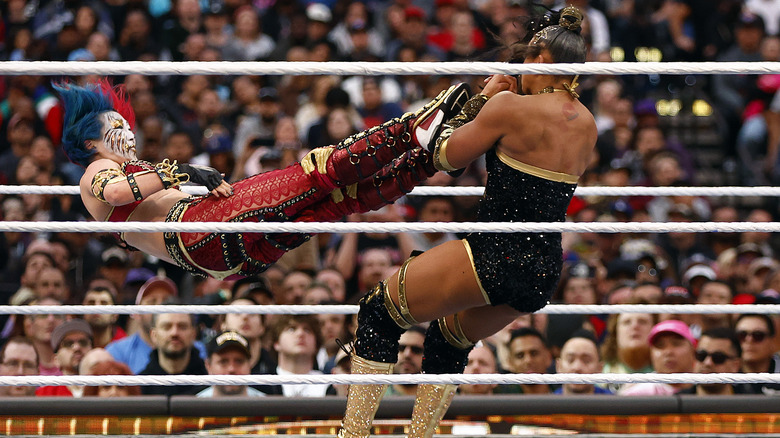Brian Gewirtz Says WWE Has Better Buzz Right Now Than In The Attitude Era
With WWE breaking all sorts of financial records, some have suggested that the company has ushered in a new "boom period" in pro wrestling for the first time since other affluent eras of the 1980s and late 1990s. Former WWE head writer Brian Gewirtz believes there is some truth to that assessment, pointing to three specific factors contributing to WWE's success, which he says are "way better than anything in the Attitude Era."
Gewirtz, in his interview with "The Masked Man Show," prefaced his comments by clarifying that the three factors were not necessarily related to the on-screen product put out by WWE.
"[The first] one, obviously, the money it's bringing in [through] rights deals to television shows — it benefitted from the fact that even though viewing is just so much more segmented now, ... WWE, like most live sports, is a show that you need to watch live ... And not just in terms of television and rights fees, but the live events, [the] two nights of WrestleMania, [and] everything that they wanted ... when I was there, is now a reality."
As for the second reason, Gewirtz pointed to the "respectability" that WWE had garnered from advertisers, Hollywood, and other industry verticals once it switched from a TV-14 to a TV-PG product. Gewirtz stressed that WWE programming suddenly became "safe ... for moms and dads to watch with their kids," which was obviously not the case during the Attitude and Ruthless Aggression Eras.
Finally, Gewirtz gave WWE props for wholeheartedly embracing the women's revolution, crediting it as the third reason for the company's recent success. "It's not even comparable to the way it was treated — and presented — in the Attitude Era," Gewirtz said of WWE's women's division.
The Palpable Impact of the Women's Revolution
Gewirtz said, "It's not that the women in the Attitude Era ... couldn't do the things that the women today are doing ... but the mindset at the time was the audience does not want to see the women in a cage match or ... a ladder match ... And that mindset has been a complete 180 now."
When reminded of the fact that WWE did higher TV ratings during the Attitude Era, Gewirtz was quick to point to multiple ways that modern fans consume the WWE product, which obviously aren't reflected in the television statistics. Furthermore, Gewirtz felt that the Attitude Era benefitted from the previous era — of the mid-1990s — producing subpar programming, giving fans a reason to tune into something new and exciting.
Gewirtz argued that "[Current] WWE's progression has been very gradual, ... whereas [the differences between] Attitude Era vs. [the] Duke "The Dumpster" Droese, Doink the Clown, [and] TL Hopper era that preceded it, ... was astronomical ... And it's the fact that you had between 'Nitro' and 'Raw,' an average, whatever it is, [of] 10 million people not only watching, but all watching at the same time ... I don't think [that mindset] can be replicated."
Another reason for Gewirtz to pick the current WWE product over the Attitude Era is the "patience" and "care" shown by WWE creative toward some storylines, specifically the acclaimed Bloodline saga. In contrast, Gewirtz says storylines ended abruptly in his years with the company in the interest of creating shock value for the viewers. "There seems to be a lot more long-term planning, ... and being able to be like, 'Maybe this might not work, but we're sticking to it.'"

